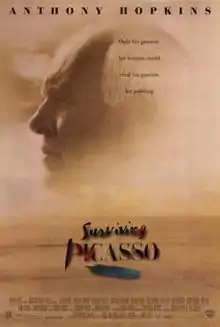Surviving Picasso
Surviving Picasso is a 1996 Merchant Ivory film directed by James Ivory and starring Anthony Hopkins as the famous painter Pablo Picasso. It was produced by Ismail Merchant and David L. Wolper. Ruth Prawer Jhabvala's screenplay was loosely based on the biography Picasso: Creator and Destroyer by Arianna Stassinopoulos Huffington.
| Surviving Picasso | |
|---|---|
 Theatrical release poster | |
| Directed by | James Ivory |
| Produced by | Ismail Merchant David L. Wolper |
| Screenplay by | Ruth Prawer Jhabvala |
| Based on | Picasso: Creator and Destroyer by Arianna Stassinopoulos Huffington |
| Starring | |
| Music by | Richard Robbins |
| Cinematography | Tony Pierce-Roberts |
| Edited by | Andrew Marcus |
| Distributed by | Warner Bros. |
Release date | September 20, 1996 |
Running time | 125 minutes |
| Country | United States |
| Language | English |
| Budget | $16 million[1] |
| Box office | $2 million[1] |
Plot
The young Françoise meets Picasso in Nazi-occupied Paris, where Picasso is complaining that people broke into his house and stole his linen, rather than his paintings. It shows Françoise being beaten by her father after telling him she wants to be a painter, rather than a lawyer. Picasso is shown as often not caring about other people's feelings, firing his driver after a long period of service, and as a womanizer, saying that he can sleep with whomever he wants.
The film is seen through the eyes of his lover Françoise Gilot (Natascha McElhone). As the producers were unable to get permission to show the works of Picasso in the film, the film is more about Picasso's personal life rather than his works, and where it does show paintings, they are not his more famous works. When Picasso is shown painting Guernica, the camera sits high above the painting, with the work only slightly visible.
The film depicts several of the women who were important in Picasso's life, such as Olga Khokhlova (played by Jane Lapotaire), Dora Maar (played by Julianne Moore), Marie-Thérèse Walter (played by Susannah Harker), and Jacqueline Roque (played by Diane Venora).
Cast
- Anthony Hopkins as Pablo Picasso
- Natascha McElhone as Françoise Gilot
- Julianne Moore as Dora Maar
- Joss Ackland as Henri Matisse
- Dennis Boutsikaris as Kootz
- Peter Eyre as Sabartes
- Peter Gerety as Marcel
- Susannah Harker as Marie-Thérèse Walter
- Jane Lapotaire as Olga Khokhlova
- Joseph Maher as Daniel-Henry Kahnweiler
- Bob Peck as Françoise's Father
- Joan Plowright as Françoise's Grandmother
- Diane Venora as Jacqueline Roque
- Dominic West as Paulo Picasso
- Laura Aikman as Maya Widmaier-Picasso
- Nigel Whitmey as Pierre
- Leon Lissek
- Andreas Wisniewski
- Anthony Milner
- Tom Fisher
- Vernon Dobtcheff as Sergei Diaghilev
- Hamish McColl
- Sandor Elès, Brigitte Kahn, Olegar Fedoro as Party Guests
- Rose English
- Judith Sharp
Reception
The film received mixed reviews. On Rotten Tomatoes it has a rating of 32% based on reviews from 19 critics.[2] On Metacritic it has a score of 55 out of 100, based on reviews from 18 critics, indicating "mixed or average reviews".[3]
References
- "Surviving Picasso (1996) - Box Office Mojo". www.boxofficemojo.com.
- "Surviving Picasso". Rotten Tomatoes. Fandango Media.
- "Surviving Picasso" – via www.metacritic.com.
External links
- Merchant Ivory Productions
- Surviving Picasso at IMDb
- Surviving Picasso at Rotten Tomatoes
- Surviving Picasso at Box Office Mojo
- John Walker. (2009) "Surviving Picasso (1996) film review". artdesigncafe.